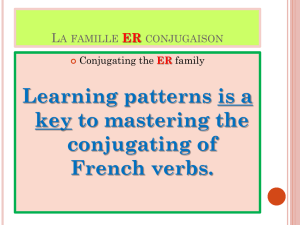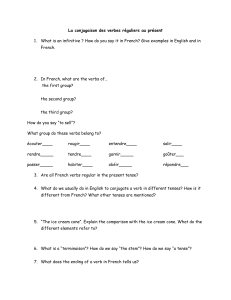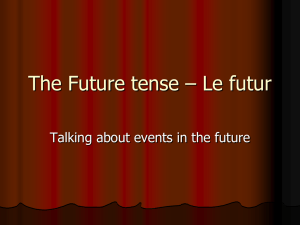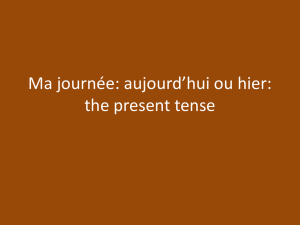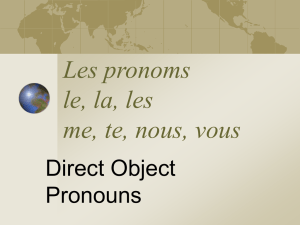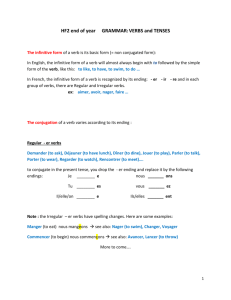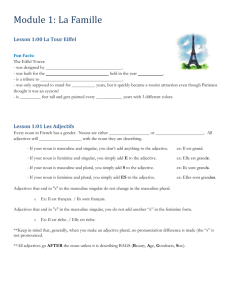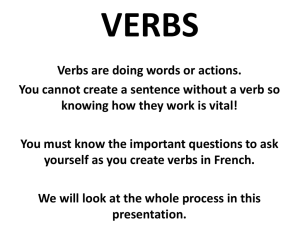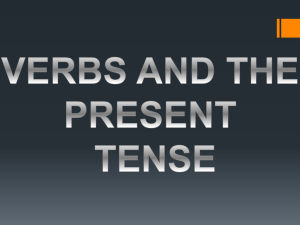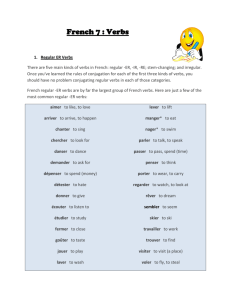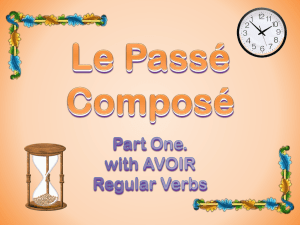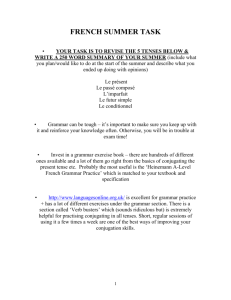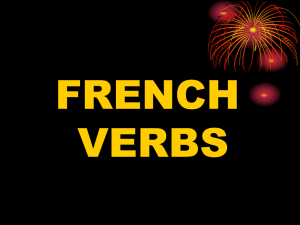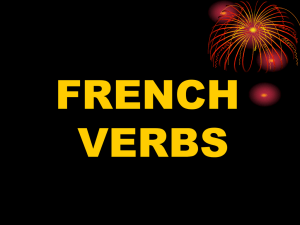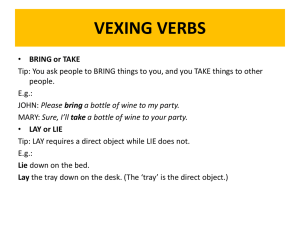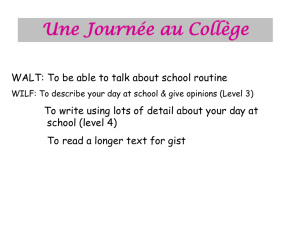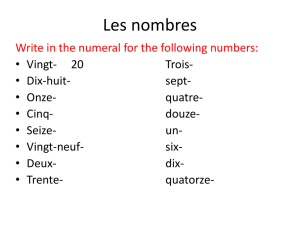Here`s the more complicated version
advertisement
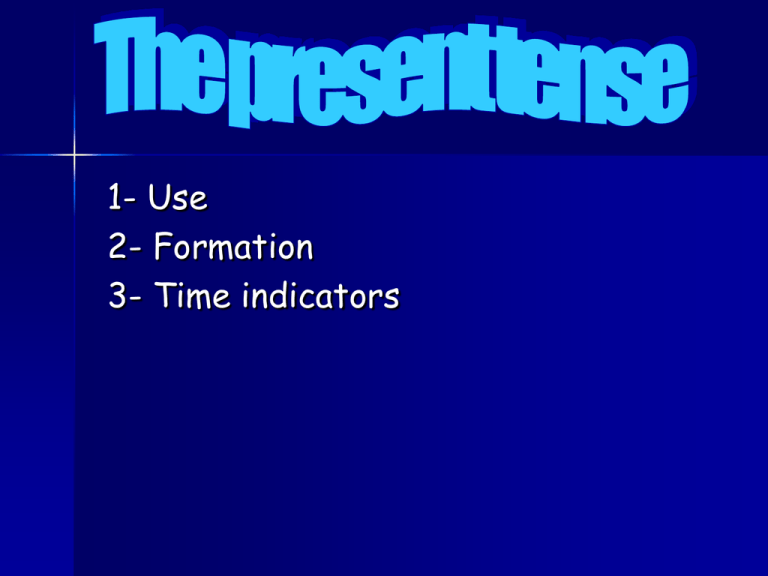
1- Use 2- Formation 3- Time indicators There is only 1 form of the present tense in French, eg Je joue au tennis whereas there are three in English... A. The present tense is used to express a repeated action, a habit or a general truth. i.e. What happens regularly. eg: Tous les samedis, je joue au foot. (Every Saturday, I play football). B.To express an action taking place at the time of speaking or in the immediate future. i.e. What is happening right now. eg: Je regarde Eastenders maintenant. (I am watching Eastenders now). C. To express a contrast, an emphasis or a negative. i.e. To emphasise what is happening. eg: Je suis d’accord. I do agree. Je joue au tennis. I do play tennis. Je ne joue pas au tennis. I don’t play tennis. D. E. F. Also use the present tense in French... To tell a story that happened in the past, to make it more lively. With expressions of time such as depuis, ça fait to express ‘has/have been doing’. With si to express a hypothesis or condition. The present tense is used with the expressions “depuis” and “ça fait” when the action is still going on. eg: J’apprends le français depuis cinq ans. (I’ve been learning French for five years). As 90% of all French verbs are regular ER verbs it is essential that you know the verb endings off by heart. Regular verbs: -ER verbs Je Tu Il, Elle, On Nous Vous Ils, Elles JOUER (to play) I play joue joues you play he / she /one plays joue jouons we play jouez you all play jouent they play Regular Verbs -IR verbs Je Tu Il, Elle, On Nous Vous Ils, Elles FINIR finis finis finit finissons finissez finissent I finish you finish he / she /one finishes we finish you all finish they finish Regular Verbs -RE verbs Je Tu Il, Elle, On Nous Vous Ils, Elles VENDRE vends vends vend vendons vendez vendent I sell you sell he/she/one sells we sell you all sell they sell Summary of Regular Verb Endings To form the present tense take off the last 2 letters of the infinitive (ER, RE or IR) and add the following endings. ER RE IR I Je -e -s -is You Tu -es -s -is - -it He/She/We Il/Elle/On -e We Nous -ons -ons -issons You all/You (f) Vous -ez -ez -issez They Ils/Elles -ent -ent -issent Verbs starting with a vowel or “h”: When a verb starts with a vowel (A, E, I, O, U, Y) or a silent “h”, the pronoun “Je” becomes “ J’ ”. eg: Je aime J’aime. Je habite J’habite. It is the same when a verb is preceded by a reflexive pronoun. eg: s’appeler: Je me appelle Je m’appelle. s’habiller: Tu te habilles Tu t’habilles. s’endormir: Elle se endort Elle s’endort. Some regular verbs have spelling changes for je, tu, il and ils. i.e. before a silent syllable. It is important that you are at least aware of these so that you will recognise these verbs. In verbs that end in -eler or -eter the final consonant is doubled up in all but the nous and vous forms. jeter: (to throw) Je jette Tu jettes Il jette Nous jetons Vous jetez Ils jettent. Another common verb belonging to this group is: appeler (to call) Exception to this rule: acheter Verbs with –é or –e in second last syllable in the infinitive Some stems with -e change to -è Stems with –é change to -è in all forms except the nous and vous forms – préférer: Je préfère Tu préfères Il préfère Nous préférons Vous préférez Ils préfèrent. acheter: J’achète Tu achètes Il achète Nous achetons Vous achetez Ils achètent. Verbs that end in –ayer, -oyer, -uyer change –y to –i nettoyer: (to clean) Je nettoie Tu nettoies Il nettoie Nous nettoyons Vous nettoyez Ils nettoient. Verbs with spelling changes in the NOUS form Verbs ending in –cer become –çons commencer: (to begin) Je commence Tu commences Il commence Nous commençons Vous commencez Ils commencent. Verbs ending in –ger become –eons manger: (to eat) Je mange Tu manges Il mange Nous mangeons Vous mangez Ils mangent Reflexive verbs Many of these verbs are used to talk about your daily routine. They mean that you do something to yourself (eg: to wash oneself, to brush one’s teeth, to wake up, to go to bed…). You conjugate them in the exact same way as regular verbs but they also need a reflexive pronoun in between the subject pronoun and the verb:… Reflexive verbs Je me Tu te Il se Elle se On se Nous nous Vous vous Ils se Elles se eg: SE LEVER (to get up) Je me lève Tu te lèves Il se lève Elle se lève On se lève Nous nous levons Vous vous levez Ils se lèvent Elles se lèvent Maintenant En ce moment Aujourd’hui Ce matin Cet après-midi Ce soir Now At the moment Today This morning This afternoon This evening
